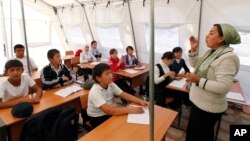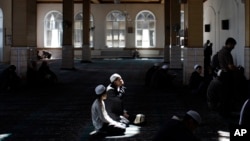After Kyrgyzstan gained its independence from the Soviet Union in 1991, Islam started taking roots in this tiny Muslim-majority Central Asian country. There are currently more than 2,000 mosques in Kyrgyzstan, and a majority of them have been built in the last quarter century.
Dilmurod Urozov of Islamic Education Center in Jalal-Abad in southwestern Kyrgyzstan, said increased religiosity among the population is one of the main reasons for the surge in the number of mosques.
“Compared to the 1990s, the number of people who perform daily prayers increased several times. Also, the social status and financial situation of the people and the society improved.”
New mosques, Urozov said, also take into account the needs and preferences of young Muslims who want more comfortable ablutions and prayer rooms.
Need for new schools
Calls for spending the money on building new schools and other needed social facilities are irrelevant, he said.
“Building such facilities is the state’s responsibility,” said Urozov. “The government announced that it was planning to build thousands of schools within a few years. So there are enough resources for building schools and other facilities.”
Kyrgyzstan is a secular state like its neighbors in the region, and by law, state and religion are separated from each other. Financing the construction of new mosques and renovation projects usually comes from local Muslim groups and charities. In recent years, foreign donors are also increasingly contributing to such causes.
“It is a very rewarding work to build a school, hospital or kindergarten, too. Those people and organizations who are negotiating with foreign sponsors should also try to invite them to build such facilities,” said Orozbek Moldaliev, head of the State Committee on Religious Affairs.
He reiterated the government does not play any role in the construction of religious facilities in Kyrgyzstan. He said, however, there are regulations and laws that any construction or religious activity should follow.
One such rule says that places of worship can be built only with the permission of the State Committee on Religious Affairs, which does not appear to have opposed the construction and renovation of mosques.
More mosques, more divisions
There are also people who are concerned about increased religiosity of people, especially youth. For them, more mosques means more divisions among the population.
The state is closely watching such tendencies, said Moldaliev, whose job it is do the watching.
In the past, mosque/state tension has been visible in Kyrgyzstan. In 2011, a scandal erupted around the opening of a prayer room in the country’s parliament. Civic groups said construction of the room violated the country’s secular constitution.
In April this year, ahead of the five-year anniversary of the unrest that brought him and his allies to power, President Almazbek Atambaev drew criticism for initiating the construction of a mosque to commemorate the uprising’s victims.
“Both government and the people of religion are careful on such matters,” said Urozov of the Islamic Education Centre. “God willing, everything will be all right. The abundance of holy places, their beauty and luxury demonstrate the nation’s culture. Look how the centuries-old mosques in Samarqand and Bukhara are elegant. Mosques have been the most beautiful buildings in our cities and villages.”
Kyrgyzstan is considered the most open and tolerant society in Central Asia. At the same time, it has been the most unstable state, witnessing two revolutions in the past decade. While almost all Muslims of the country belong to the Sunni sect of Islam, and no noticeable religious tensions have been reported, possibility of ethnic conflict between Uzbeks and Kyrgyzs is still high.
Traditionally, Uzbeks have been more religious than the majority Kyrgyzs, and more mosques are being built and renovated in Uzbek-populated areas than the more secular Kyrgyz majority areas. Activists worry that the division could pave the way for a new conflict.






